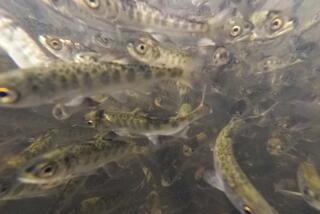Texas aquarium accidentally kills nearly all fish in its biggest indoor tanks
- Share via
Texas State Aquarium accidentally killed almost all the fish in its two biggest indoor tanks, an aquarium spokesman told the Los Angeles Times.
The animals at the aquarium in Corpus Christi died Tuesday when a new medication was introduced into the water in an effort to control a parasite that was resistant to other treatments, spokesman Richard E. Glover Jr. said.
Such an incident “is extremely rare,” said Rob Vernon, spokesman for the Assn. of Zoos and Aquariums.
“It appears to be a truly sad fluke,” Glover said. “Considerable losses were sustained.”
Before introducing the chemical into the tanks, staffers tested it on a smaller exhibit and found no adverse reaction, he said.
As many as 100 fish were killed in the four affected tanks, the largest of which holds 125,000 gallons, Glover said.
That largest tank held an exhibit called the Islands of Steel, featuring nurse sharks, green moray eels, spadefish, amberjack, tarpon, grouper and a sand tiger shark, according to the aquarium’s website.
The creatures the aquarium was trying to kill were the trematoda parasite, Glover said.
“Trematoda is a class within the phylum Platyhelminthes,” he said. “It includes two groups of parasitic flatworms, known as flukes. They are internal parasites.”
Glover did not specify what chemical was used to try to kill the parasite, but the aquarium said in a statement that it “is commonly used by many other aquariums in treating similar issues.”
“Nothing like this has ever happened before,” Glover said.
Staffers worked through the night to save as many animals as possible and try to figure out what went wrong, and water samples have been sent to labs for testing, he said.
An official at the Aquarium of the Pacific in Long Beach said he sympathizes with the Texas aquarium staffers.
“We manage health problems like parasite infections in fish and also take precautionary steps to minimize the risk to the fish, but complications can still occur,” Perry Hampton, Aquarium of the Pacific vice president of animal husbandry, told the Los Angeles Times in an email.
“Fortunately,” he said, “we have not experienced such a significant adverse reaction to date and empathize with the staff over the loss of their animals.”
Follow Ryan Parker on Twitter, Facebook and Instagram
More to Read
Sign up for Essential California
The most important California stories and recommendations in your inbox every morning.
You may occasionally receive promotional content from the Los Angeles Times.














